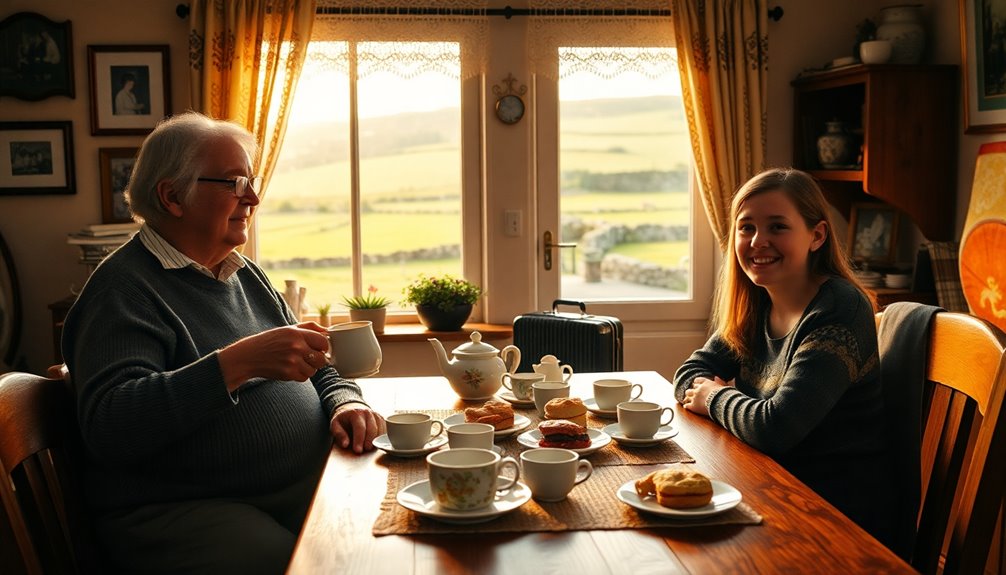
If you stay with an Irish host family, you’ll join daily routines like shared meals, light chores and casual conversation to boost your English. Ask about house rules, curfews and meal times early, offer help in the kitchen, and be ready to adapt. Bring layers, a waterproof jacket, copies of documents and basic medicines. Use simple starters, request corrections and try a language exchange to improve quickly — keep going to discover more practical tips and solutions.
Highlights
- Ask about house rules, curfew, chores, and mealtime routines before arrival to ensure clear expectations and compatibility.
- Confirm language-practice opportunities, like family conversations, language exchanges, or local activities that boost speaking confidence.
- Pack adaptive clothing, comfortable shoes, a waterproof jacket, plug adapter, prescriptions, and copies of travel documents and insurance.
- Use simple conversation starters, request corrections, and carry a phrase list to learn everyday Irish expressions and idioms.
- Contact your agency by phone for emergencies and email for non-urgent issues, keeping records and requesting mediation if needed.
What to Expect From Living With an Irish Host Family
Living with an Irish host family means you’ll be part of daily routines—shared meals, household chores, and casual chats—so expect a mix of privacy and participation depending on the family. You’ll gain practical cultural immersion: everyday phrases, local customs, and mealtime rhythms that classroom lessons don’t offer. Observe family dynamics—how decisions are made, how humour and respect flow—and adapt your responses. You can set boundaries and seek independence while joining activities that boost language confidence. Be proactive: ask about routines, offer help, and suggest personal study times so your freedom and learning both thrive.
How to Choose the Right Homestay for Your Learning Goals
Think about how the host family’s house rules fit with your study routine and comfort level, since consistent expectations help you stay focused. Ask about daily schedules and whether they offer or support specific language or cultural activities that match your learning goals. Choosing a homestay that balances clear rules with relevant activities will make your time in Ireland more productive and enjoyable.
Match House Rules
Since you’ll be spending daily time in your host family’s home, check house rules against your study habits and goals so you know whether the environment will support learning; for example, ask about quiet hours for studying, use of communal spaces for online lessons, guest and roommate policies, and expectations around phones, TV and mealtimes. You’ll want clear house etiquette: where you can study, whether meals are shared, and recycling or cleaning routines. Ask about guest expectations so you can invite friends or host classmates without surprises. Choose a home that balances structure with freedom, matching rules to your daily rhythm and learning needs.
Focus on Activities
If you want to improve specific skills or make the most of your time abroad, pick a homestay whose daily activities align with your learning goals: ask about family routines, hobbies, and local outings so you can practice speaking, listening, or cultural skills in real situations. Choose hosts who share cultural activities like cooking, music or storytelling if you want conversational practice. If you prefer immersion, ask about nearby local events, markets or clubs to build confidence in varied settings. Be clear about your goals before arriving, agree on how often you’ll join activities, and keep a flexible, independent mindset to learn freely.
Typical Daily Routines and Mealtime Customs in Irish Homes

When you stay with an Irish host family, you’ll find days are usually structured around work and school timetables, with mornings busy and evenings centered on shared meals and relaxation; hosts tend to appreciate guests who keep to household routines, let them know about plans, and join in mealtimes when invited. You’ll notice meal traditions like hearty breakfasts, simple packed lunches, and family dinners around 18:00–20:00. Respect daily habits: tidy up after yourself, ask about dietary needs, and offer to help clear the table. Enjoy flexible free time but communicate plans so your hosts aren’t surprised.
Communication Tips to Improve English While Staying With Hosts
Although you might feel shy at first, staying with an Irish host family is a great chance to practise everyday English in real situations. Use simple conversation starters—ask about meals, music, or town tips—to open friendly chats. Offer a language exchange: you help with their language while they help with yours. Listen actively, repeat phrases you like, and ask for corrections kindly. Carry a small phrase list and note new words. Join family activities to learn natural expressions. Be relaxed and curious; freedom to try and make mistakes will speed your progress and deepen connections with your hosts.
Rules, Curfews, and Household Responsibilities Explained
You’ll want to start by asking your hosts about their house rules and any curfew so you know what’s expected. Be clear on common chores—like washing dishes, taking out bins, or helping with meals—and agree who does what. Following these simple guidelines helps avoid misunderstandings and shows respect for your host’s home.
House Rules Overview
House rules keep everyone comfortable and safe, so it’s important you know what’s expected around curfews, noise, guests, and shared chores. You’ll learn simple household etiquette: quiet hours, where to store shoes, and how to use common areas respectfully. Curfews vary—ask and agree one that fits your schedule and their routine. Guest expectations matter: tell your host before inviting friends, limit overnight stays unless approved, and keep visitors respectful. If you want more freedom, discuss boundaries openly. Clear, polite communication prevents misunderstandings and helps you enjoy homestay life without tension.
Chores and Responsibilities
When you move into a homestay, you’ll be expected to follow simple rules about chores, curfews, and daily responsibilities so everyone knows what to expect and the household runs smoothly. You’ll get a clear list of cleaning schedules and shared responsibilities—who tidies common areas, takes out bins, and cleans bathrooms. Curfews are flexible but respected; discuss reasonable times with your host. Be proactive: ask about expectations, volunteer for tasks that suit you, and suggest swaps if needed. Good communication keeps your independence while respecting the home. Small, consistent efforts make living together easy and fair.
Handling Cultural Differences and Sensitive Topics Politely
Many hosts and guests face moments where cultural differences or sensitive subjects come up, and knowing a polite, practical way to respond makes stays smoother. You should practice cultural sensitivity by listening first, asking gentle questions, and avoiding assumptions. Use neutral language and short phrases to steer polite conversations to shared topics like food, music, or plans. If a topic makes you uncomfortable, say so calmly: “I’d prefer not to discuss that.” Your host will usually respect boundaries. Remember, freedom in conversation means choosing when to engage; clear, respectful limits keep relationships positive and learning enjoyable.
Practical Safety, Health, and Emergency Procedures in Homestays
Respecting boundaries and clear communication about sensitive topics goes hand-in-hand with being prepared for safety and health matters in a homestay. You should ask your host about house safety protocols: fire exits, smoke alarms, first-aid kit location, and any household rules about locks or visitors. Share relevant health information, allergies, and medications so your host can help if needed. Keep a list of emergency contacts visible—local emergency number, your country’s embassy, and a trusted friend. Know how to get medical help: nearby GP, pharmacy hours, and walk-in clinics. Stay aware, ask questions, and keep your freedom with responsibility.
Costs, Payment Methods, and What’s Usually Included
How much will you actually pay, and what does that fee cover? You’ll get a clear cost breakdown before you book: weekly or monthly rates, any registration or placement fees, and extra charges for laundry or extra meals. Most homestays include a private or shared room, breakfast and dinner on weekdays, and utilities. You can choose payment options like bank transfer, card, or trusted platforms; some hosts accept cash on arrival. Always ask for a written agreement listing inclusions and any house rules. This helps you keep freedom, avoid surprises, and manage your budget with confidence.
How Homestays Support Language Practice Beyond Lessons

Because you live with native speakers, you’ll get constant, natural exposure to everyday language—phrases, accents, slang and cultural references—that classroom lessons rarely cover. You’ll practice speaking during meals, errands, and relaxed chats, so language immersion becomes part of your routine. Hosts correct gently, suggest local expressions, and invite you to join social events, making cultural exchange natural and ongoing. You can try new vocabulary safely, ask about idioms, and get instant feedback. This relaxed, real-world practice boosts confidence, fluency, and listening skills faster than isolated study, while respecting your freedom to explore at your own pace.
What to Pack and Prepare Before Arriving in Ireland
Living with a host gives you plenty of chances to practice language, and planning what to bring will help you take full advantage of those moments from day one. Pack light but smart: adaptable layers, waterproof jacket, comfortable shoes, and an adapter for plugs. Include basic toiletries, any prescription medicines, and a small welcome gift for your hosts. Carry copies of Travel Documents, passport, visa, and health insurance—both physical and digital. Bring a notebook, phone charger, and a compact umbrella. Learn a few household phrases before you arrive so you can be independent and start conversations confidently.
Resolving Problems: When and How to Contact Your Agency or School
When should you contact your agency or school? Contact them promptly for safety issues, serious conflicts with your host, or if living conditions affect your health. Use the agency’s preferred contact methods—phone for emergencies, email or messaging apps for non-urgent matters. Describe the problem clearly, give dates, and suggest reasonable solutions. Keep records of messages and responses to support problem resolution. If you want more independence, ask about alternative homestays or mediation services early. Don’t wait until small issues grow; timely, calm communication helps you stay safe, free, and focused on learning English.
Some Questions Answered
Can I Invite Friends Over to Visit My Host Family?
Yes, you can usually invite friends, but you should always ask your host first and follow guest etiquette. Be clear about visit time, number of guests, and how long they’ll stay. Respect house rules, quiet hours, and shared spaces. Offer to introduce your friends, tidy up afterwards, and make sure they behave politely. If your host says no or sets limits, don’t argue—respect their decision and find another plan.
Are Pets Allowed in Homestay Bedrooms?
Usually, no — pets aren’t allowed in homestay bedrooms unless your host’s pet policies and homestay rules say otherwise. Imagine soft paws padding in the hallway: some hosts welcome animals, others need bedrooms pet-free for allergies, cleanliness or comfort. Ask your host before arrival, explain any service-animal needs, and respect their decision. Clear communication keeps you free to enjoy the stay while following house rules and avoiding surprises.
Can I Receive Mail and Deliveries at the Homestay?
Yes — you can usually receive mail and deliveries at the homestay. Check with your host about mail forwarding, preferred delivery services, and any limits on packages. You’ll want a clear agreement on who signs, where parcels are left, and how long items stay. If you need regular post or big shipments, arrange mail forwarding to a trusted address or use delivery services offering pick-up points so you stay flexible and worry-free.
Is There Space to Store Musical Instruments or Sports Gear?
Yes — you’ll usually have space for musical storage and sports gear. Hosts often offer a closet, spare room corner, or lockable cupboard where instruments and equipment can be kept. Ask about gear safety and whether cases, stands, or wall mounts are allowed. If you need large items like bikes or drum kits, discuss storage location and access. That way you keep freedom to practice and stay worry-free about your belongings.
Do Hosts Accommodate Special Diets Like Vegan or Gluten-Free?
Like a tailor-made jacket, many hosts will accommodate special diets like vegan or gluten-free. You’ll discuss dietary preferences before arrival, so meal planning fits your needs and freedom to choose. Hosts vary: some cook all meals, others prepare shared dishes or let you use the kitchen. Be clear about allergies, preferred ingredients, and meal times. That way you’ll enjoy safe, nutritious meals and feel independent during your stay.
Summing Everything Up
So you’ll survive Irish homestays — maybe even improve your English while pretending not to notice the endless cups of tea. You’ll learn rules, curfews, and that “a bit” of homework really means help with the dishes. Pick hosts who match your goals, pack sensible clothes, and tell your agency if things go sideways. Enjoy awkward small talk; it’s practice disguised as hospitality, and you’ll leave richer in language and stories.
